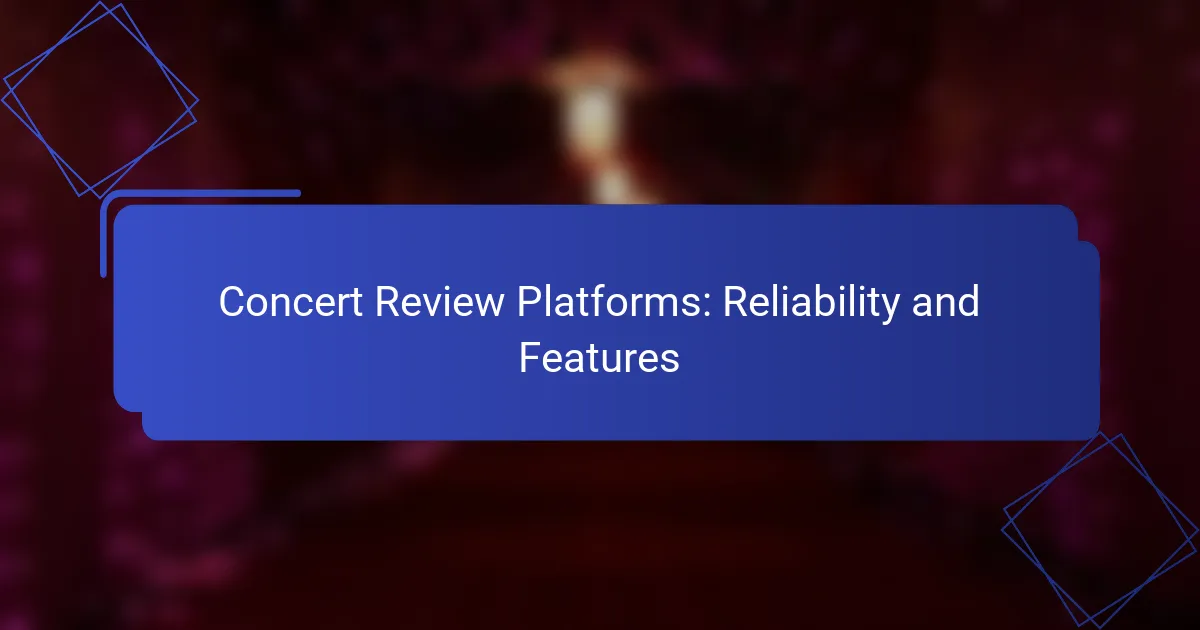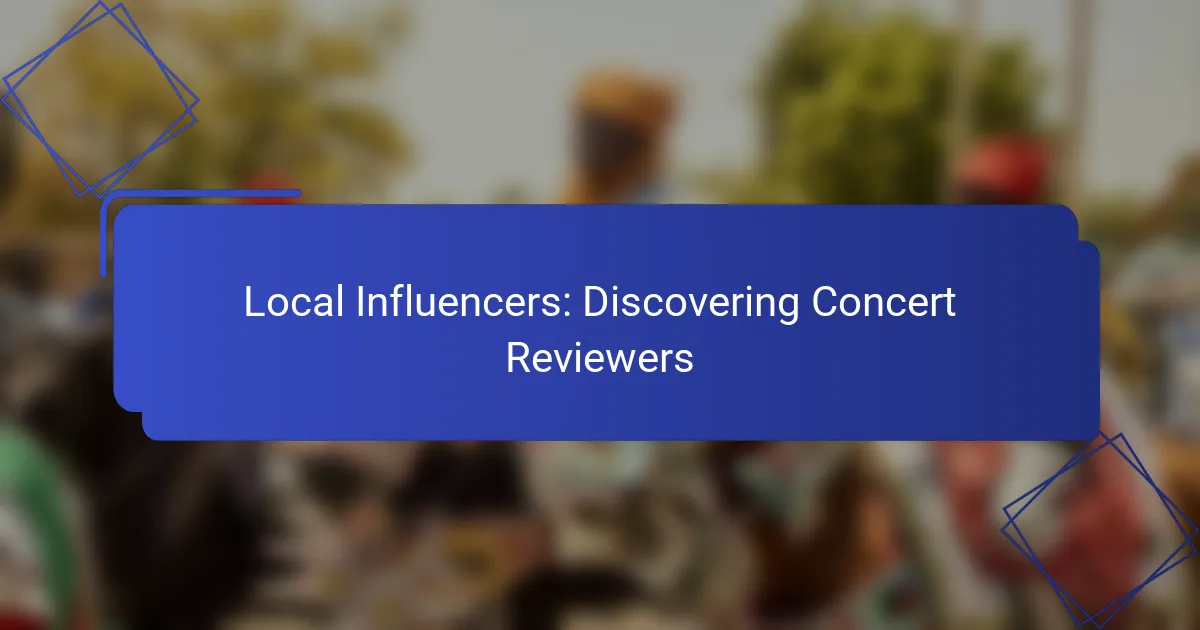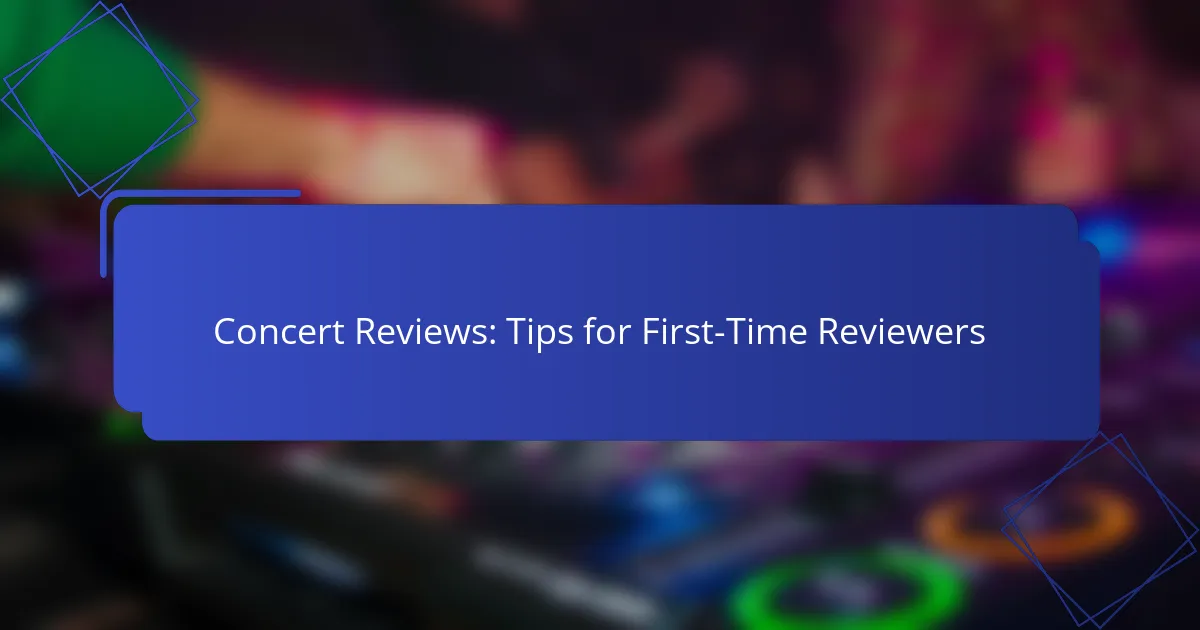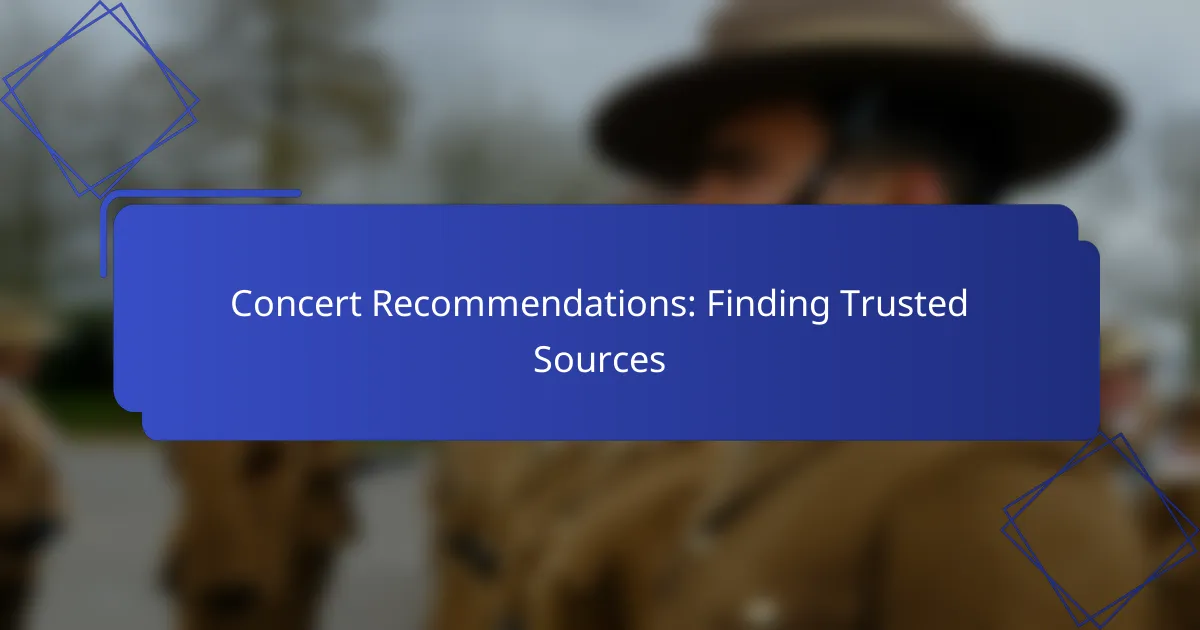Reliable concert review platforms are essential for music enthusiasts seeking accurate and insightful critiques of live performances. When evaluating these platforms, consider factors such as the reputation of the site, the expertise of its reviewers, and the variety of perspectives available. Additionally, features like user-generated reviews, editorial content, and multimedia integration can significantly enhance the depth of information, aiding in informed concert decisions.
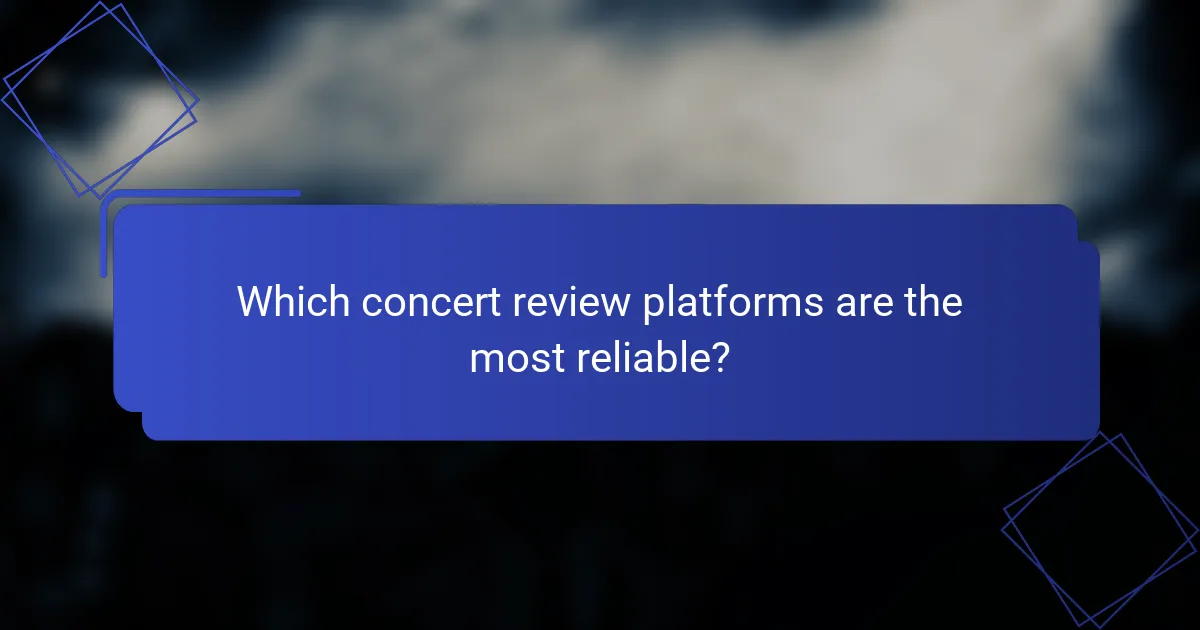
Which concert review platforms are the most reliable?
Reliable concert review platforms are those that consistently provide accurate, insightful, and well-rounded critiques of live performances. Key factors to consider include the platform’s reputation, the expertise of its reviewers, and the diversity of perspectives offered.
Pitchfork
Pitchfork is known for its in-depth reviews and strong focus on indie and alternative music. The platform often features critiques that delve into the artistic elements of performances, making it a go-to for fans seeking thoughtful analysis.
When using Pitchfork, look for reviews that highlight both the strengths and weaknesses of a concert. This balanced approach helps readers form a well-rounded view of the event.
Rolling Stone
Rolling Stone has a long-standing reputation in the music industry, covering a wide range of genres. Its concert reviews often include insights from seasoned critics who provide context about the artist’s career and the significance of the performance.
Consider checking Rolling Stone for reviews that not only evaluate the concert but also discuss the cultural impact of the artist. This can enhance your understanding of the event’s relevance.
Billboard
Billboard focuses on mainstream music and often features reviews that are tied to chart performance. Its concert critiques typically emphasize the commercial aspects of live shows, making it a reliable source for fans interested in popular music trends.
When reading Billboard reviews, pay attention to how the performance aligns with current music trends and chart positions. This can provide valuable context for understanding the concert’s impact.
Consequence of Sound
Consequence of Sound offers a mix of concert reviews, news, and features that cater to a diverse audience. The platform is known for its passionate writing and detailed coverage of live performances across various genres.
Look for reviews that include personal anecdotes from the concert, as these can add depth and relatability to the critique. This platform often captures the atmosphere of the event effectively.
NME
NME provides a blend of music news and concert reviews, focusing on both established and emerging artists. The reviews are typically concise and engaging, making them accessible to a broad audience.
When exploring NME reviews, consider the quick summaries and key takeaways that can help you gauge the overall quality of a concert without wading through lengthy text. This can be particularly useful for busy fans looking for quick insights.
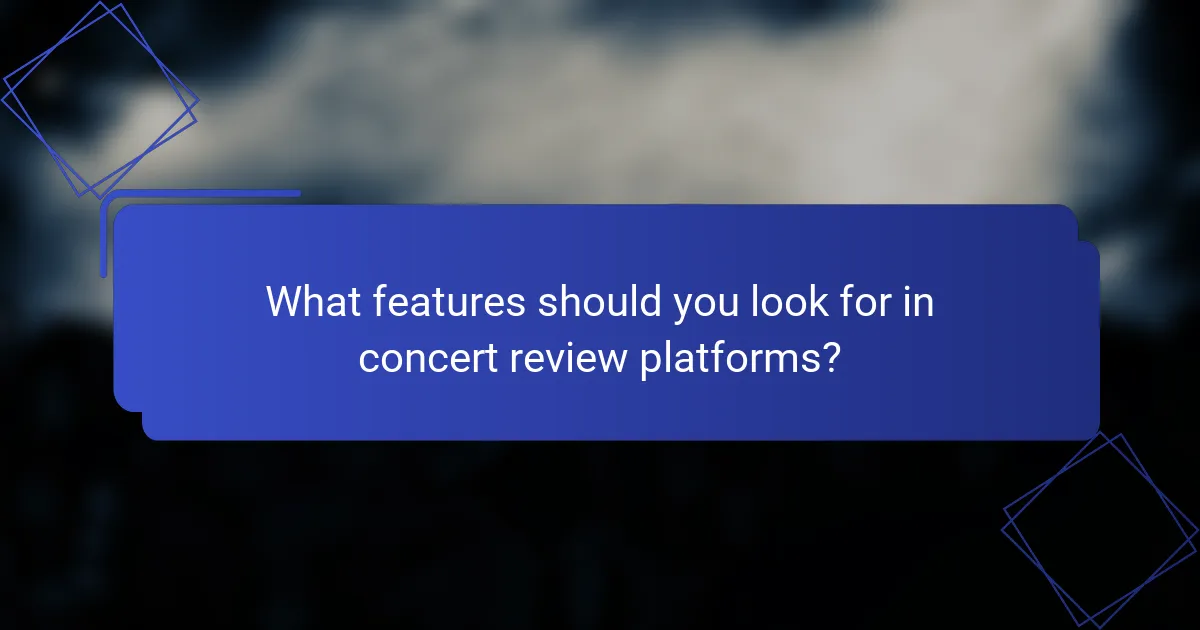
What features should you look for in concert review platforms?
When evaluating concert review platforms, prioritize user-generated reviews, editorial content, rating systems, and multimedia integration. These features enhance the reliability and depth of the information available, helping you make informed decisions about concerts.
User-generated reviews
User-generated reviews are essential for understanding the concert experience from the audience’s perspective. Look for platforms that allow fans to share their thoughts and ratings after attending events. This firsthand feedback can provide insights into the performance quality, venue atmosphere, and overall enjoyment.
Consider platforms that have a robust system for filtering and sorting reviews. This can help you find the most relevant opinions based on factors like the date of the concert or the specific artist. Be cautious of platforms that lack moderation, as they may feature biased or fake reviews.
Editorial content
Editorial content adds a layer of professionalism and expertise to concert review platforms. Articles written by music critics or industry professionals can provide context and analysis that user reviews may lack. This content often includes interviews, previews, and post-concert reflections that enhance your understanding of the event.
Look for platforms that balance user reviews with editorial insights. A good mix can help you gauge not only the audience’s reactions but also the critical reception of the performance. This dual perspective can be particularly valuable when considering whether to attend a concert.
Rating systems
Effective rating systems are crucial for quickly assessing concert quality. Platforms should use clear and consistent metrics, such as star ratings or numerical scores, to summarize user opinions. This allows you to compare different concerts at a glance.
Be wary of overly simplistic rating systems that do not capture nuances. A five-star scale is common, but some platforms may offer more detailed breakdowns, such as separate ratings for performance, venue, and sound quality. These detailed ratings can provide a more comprehensive view of what to expect.
Multimedia integration
Multimedia integration enhances the concert review experience by providing visual and auditory context. Look for platforms that include photos, videos, and audio clips from the concert. This can give you a better sense of the atmosphere and performance quality.
Consider platforms that allow users to upload their multimedia content alongside reviews. This can enrich the overall experience and provide a more vivid picture of the event. However, ensure that the platform maintains quality control to prevent low-quality or irrelevant media from cluttering the reviews.
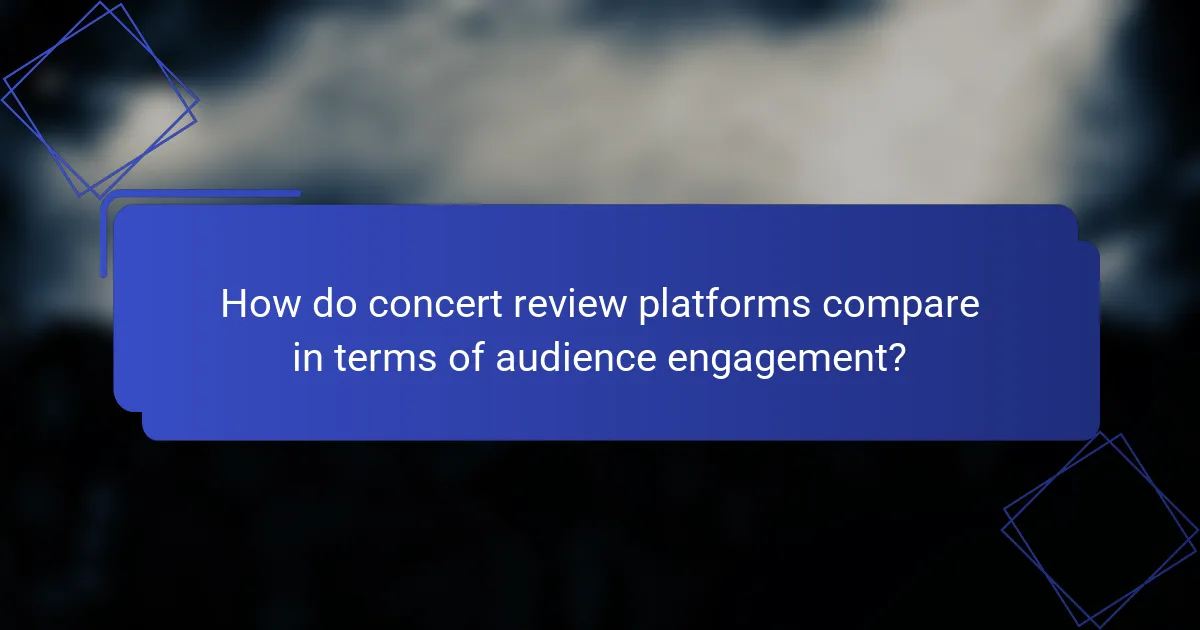
How do concert review platforms compare in terms of audience engagement?
Concert review platforms vary significantly in audience engagement, with some fostering active discussions and others offering limited interaction. Key factors include social media presence, comment sections, and community forums, each playing a role in how users connect and share experiences.
Social media presence
Social media presence is crucial for concert review platforms as it enhances audience engagement through real-time interactions. Platforms that actively share content on social media channels like Facebook, Twitter, and Instagram often see higher user participation and feedback. For instance, a platform with a robust Instagram account may encourage users to share their concert photos and tag the platform, creating a vibrant community.
Consider following platforms that regularly post updates, engage with followers, and respond to comments. This not only boosts visibility but also fosters a sense of belonging among users, making them more likely to return and participate.
Comment sections
Comment sections on concert review platforms allow users to express their opinions and engage in discussions about specific events. A well-moderated comment section can lead to insightful conversations, while poorly managed ones may deter participation due to spam or negativity. Look for platforms that encourage constructive feedback and have guidelines in place to maintain a positive environment.
When evaluating comment sections, consider the volume of interactions and the quality of discussions. Platforms with active comment sections often feature a mix of fan insights, critiques, and personal experiences, enriching the overall review experience.
Community forums
Community forums provide a dedicated space for concert-goers to discuss various topics related to live music, including reviews, artist news, and upcoming events. These forums can foster a sense of community, allowing users to build connections based on shared interests. Platforms that host active forums often see higher engagement levels as users return to share updates and participate in discussions.
When assessing community forums, look for those that are well-organized and have active moderators. A vibrant forum typically features threads on recent concerts, artist discussions, and tips for attending shows, making it a valuable resource for fans seeking deeper engagement.
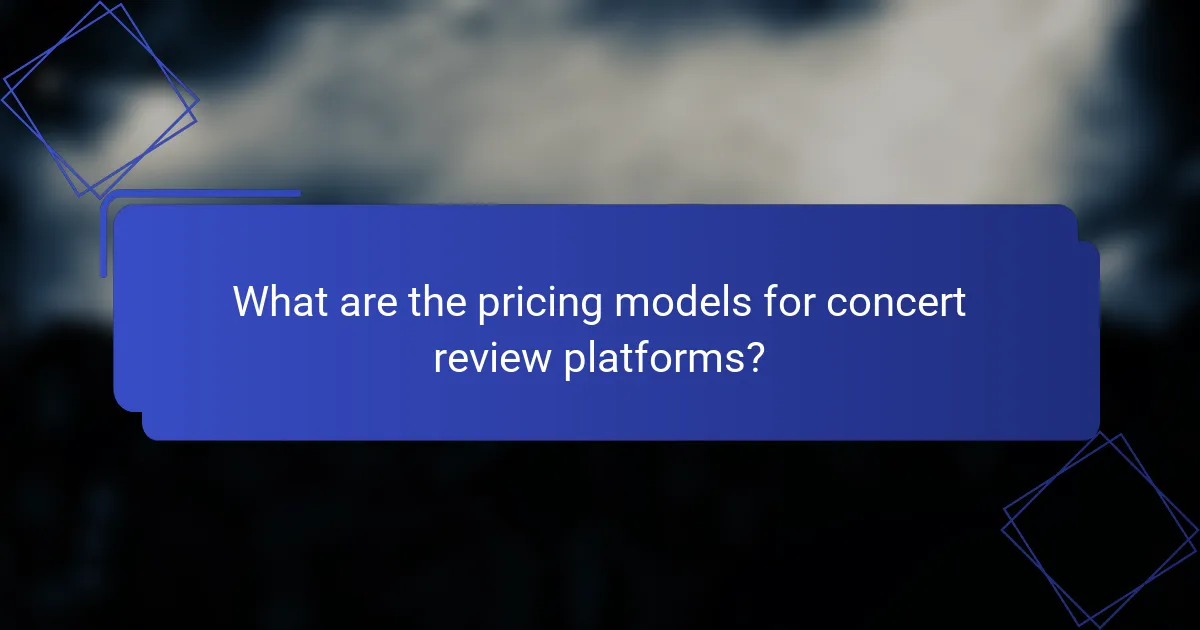
What are the pricing models for concert review platforms?
Concert review platforms typically offer a variety of pricing models, including free access, subscription fees, and ad-supported content. Understanding these models can help users choose the best option based on their needs and budget.
Free access
Many concert review platforms provide free access to their content, allowing users to read reviews and ratings without any cost. This model often relies on user-generated content, where fans contribute their experiences and insights.
While free access is appealing, it may come with limitations, such as fewer features or the presence of ads. Users should consider whether the available content meets their needs before relying solely on free platforms.
Subscription fees
Subscription-based concert review platforms charge users a recurring fee for premium access to exclusive content, features, or enhanced functionalities. Fees can vary widely, typically ranging from a few dollars to around twenty dollars per month, depending on the platform’s offerings.
Subscribing often grants users access to in-depth reviews, advanced filtering options, and ad-free experiences. It’s essential to evaluate the value of these features against the cost to determine if a subscription is worthwhile.
Ad-supported content
Some concert review platforms utilize an ad-supported model, providing free access while generating revenue through advertisements. This approach allows users to access content without direct costs, but it may lead to a cluttered experience due to frequent ads.
Users should be aware that ad-supported platforms might prioritize ad placements over user experience. Balancing the benefits of free access with potential distractions from ads is crucial when choosing a platform.
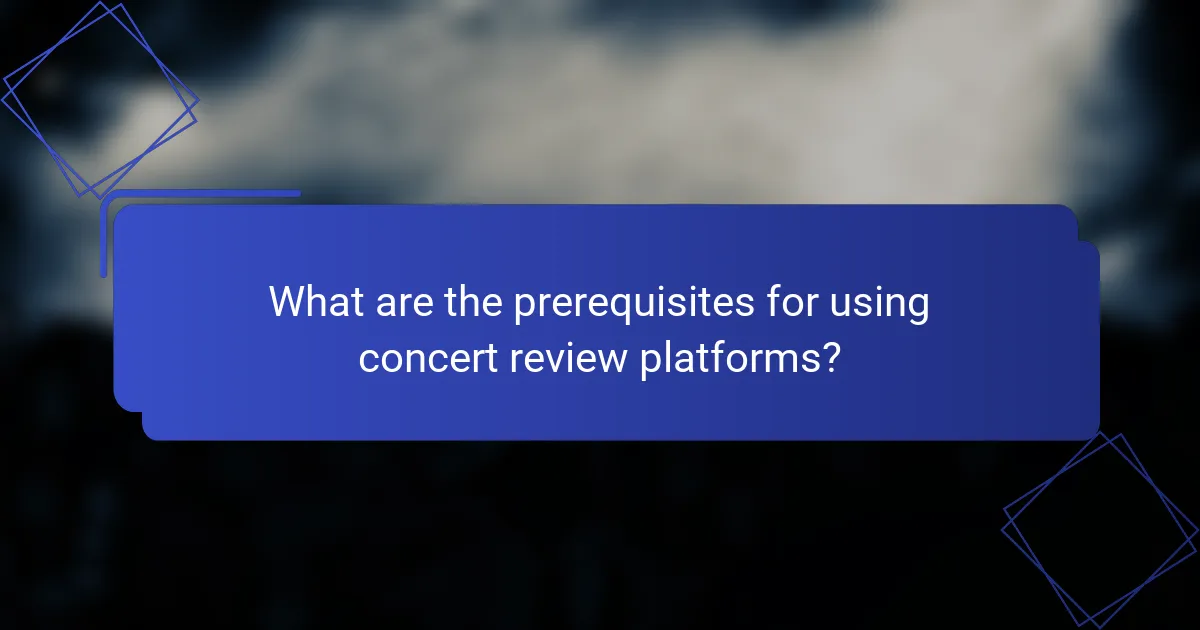
What are the prerequisites for using concert review platforms?
To effectively use concert review platforms, users typically need to create an account and agree to the platform’s terms of service. Familiarity with the platform’s features and navigation can also enhance the review experience.
Account creation
Creating an account on a concert review platform usually involves providing basic personal information such as your name, email address, and sometimes a password. Some platforms may also require you to verify your email to activate your account.
When signing up, consider whether the platform allows social media logins, which can streamline the process. Additionally, check for any age restrictions, as some platforms may require users to be at least 13 or older, in compliance with regulations like COPPA in the U.S.
Be mindful of privacy settings during account creation. Review platforms often allow you to control who can see your reviews and personal information, which is crucial for maintaining your privacy while sharing opinions on concerts.
